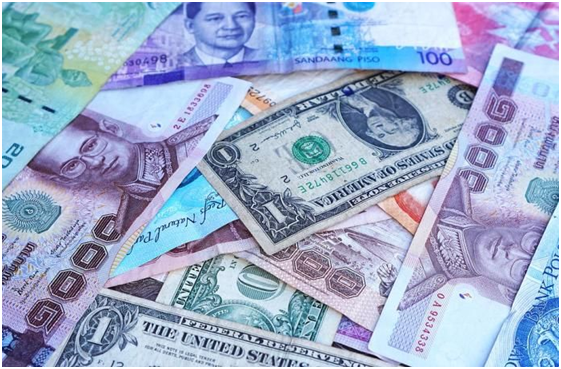
Due to the recent strengthening of the US dollar index, the currencies of many countries have fallen significantly, among which the performance of Asian currencies represented by the Japanese yen and the Korean won is particularly noteworthy. In the face of the adverse situation, many Asian countries represented by China, Japan and South Korea to rescue foreign exchange, although the market exchange rate has temporarily corrected, but some experts said that the strong dollar is taking away capital from emerging economies, which has a particularly severe impact on Asian countries.
First of all, from the economic perspective, the impact of currency depreciation on Asian countries is mainly reflected in the following aspects:
Trade impact: Currency depreciation reduces the value of the domestic currency relative to other currencies, which in turn increases the price competitiveness of exports. This is good news for Asia, where exports are the main pillar of the economy. However, this could also lead to an increase in the cost of imports, which would have an impact on the domestic price level.
Investment impact: Currency depreciation can trigger capital outflows as foreign investors may move their money to more profitable markets. That could cause Asian countries to run out of money, which could affect economic growth. In addition, currency depreciation may also affect the investment decisions of multinational companies, as they may reassess the return on investment in Asian countries.
Debt impact: For Asian countries, currency depreciation means a higher burden of dollar-denominated debt. This could lead to a downgrade in the country's credit rating, which in turn would increase financing costs. This could be a serious problem for countries already facing high debt burdens.

Secondly, from a social perspective, the impact of currency depreciation on Asian countries cannot be ignored:
Rising prices: A depreciating currency can make imported goods more expensive, which in turn pushes up the domestic price level. This will have a negative impact on the lives of ordinary people, especially those with low incomes. They may need to pay a higher cost of living without a corresponding increase in income levels.
Employment pressure: The devaluation of the currency may cause some export enterprises to face difficulties, as their products become less price competitive in the international market. That could lead companies to lay off workers or close factories, adding to employment pressures. This could be a serious problem for regions that rely on export industries.
Social stability: Currency devaluation can trigger social discontent, as ordinary people may feel that the cost of living has risen without increasing income levels. This could lead to an increase in social instability, such as protests and demonstrations.
Finally, from a political perspective, currency depreciation may also have an impact on the political stability of Asian countries:
Lower trust in government: If the government is unable to effectively deal with the economic problems caused by the devaluation of the currency, then its trust may decline. This could lead to increased voter dissatisfaction with the government, which could affect political stability.
Diplomatic tensions: Currency devaluation can trigger trade disputes and frictions with other countries. For example, some countries may take measures to protect their industries from the impact of currency depreciation, triggering a trade war or trade dispute. This will have a negative impact on the foreign relations of Asian countries.
It can be said that the impact of recent currency devaluations on Asian countries is complex and widespread. In order to meet this challenge, Asian countries, especially major economies such as China, Japan and the ROK, need to strengthen policy coordination, promote economic restructuring, and strengthen international cooperation to maintain financial market stability and healthy economic development.

Recently, the Japanese food industry is undergoing an unprecedented price adjustment.
Recently, the Japanese food industry is undergoing an unpre…
Artificial intelligence has created a device that converts …
China Japan relations have become tense due to erroneous st…
The Federation of German Industries (BDI) has recently issu…
The latest annual report from the United Nations Conference…
On December 4, 2025, the U.S. stock market once again stage…